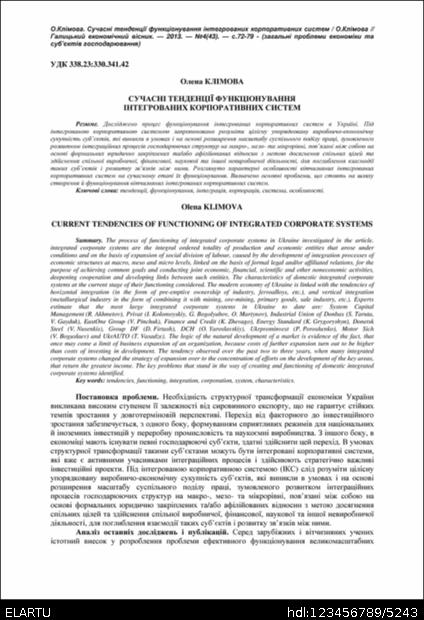Empreu aquest identificador per citar o enllaçar aquest ítem:
http://elartu.tntu.edu.ua/handle/123456789/5243

| Títol: | Сучасні тенденції функціонування інтегрованих корпоративних систем |
| Altres títols: | Current tendencies of functioning of integrated corporate systems |
| Autor: | Клімова, Олена Klimova, Olena |
| Bibliographic description (Ukraine): | О.Клімова. Сучасні тенденції функціонування інтегрованих корпоративних систем / О.Клімова // Галицький економічний вісник. — 2013. — №4(43). — с.72-79 - (загальні проблеми економіки та суб’єктів господарювання) |
| Data de publicació: | 2013 |
| Date of entry: | 15-de -2014 |
| Editorial: | Тернопільський національний технічний університет ім. Івана Пулюя |
| Place of the edition/event: | Тернопіль, Україна |
| UDC: | 338.23 330.341.42 |
| Paraules clau: | тенденції функціонування інтеграція корпорація система особливості tendencies functioning integration corporation system characteristics |
| Resum: | Досліджено процес функціонування інтегрованих корпоративних систем в Україні. Під інтегрованою корпоративною системою запропоновано розуміти цілісну упорядковану виробничо-економічну сукупність суб’єктів, які виникли в умовах і на основі розширення масштабу суспільного поділу праці, зумовленого розвитком інтеграційних процесів господарюючих структур на макро-, мезо- та мікрорівні, пов’язані між собою на основі формальних юридично закріплених та/або афілійованих відносин з метою досягнення спільних цілей та здійснення спільної виробничої, фінансової, наукової та іншої невиробничої діяльності, для поглиблення взаємодії таких суб’єктів і розвитку зв’язків між ними. Розглянуто характерні особливості вітчизняних інтегрованих корпоративних систем на сучасному етапі їх функціонування. Визначено основні проблеми, що стоять на шляху створення й функціонування вітчизняних інтегрованих корпоративних систем. The process of functioning of integrated corporate systems in Ukraine investigated in the article. integrated corporate systems are the integral ordered totality of production and economic entities that arose under conditions and on the basis of expansion of social division of labour, caused by the development of integration processes of economic structures at macro, meso and micro levels, linked on the basis of formal legal and/or affiliated relations, for the purpose of achieving common goals and conducting joint economic, financial, scientific and other noneconomic activities, deepening cooperation and developing links between such entities. The characteristics of domestic integrated corporate systems at the current stage of their functioning considered. The modern economy of Ukraine is linked with the tendencies of horizontal integration (in the form of pre-emptive ownership of industry, ferroalloys, etc.), and vertical integration (metallurgical industry in the form of combining it with mining, ore-mining, primary goods, sale industry, etc.). Experts estimate that the most large integrated corporate systems in Ukraine to date are: System Capital Management (R. Akhmetov), Privat (I. Kolomoyskiy, G. Bogolyubov, O. Martynov), Industrial Union of Donbas (S. Taruta, V. Gayduk), EastOne Group (V. Pinchuk), Finance and Credit (K. Zhevago), Energy Standard (K. Grygoryshyn), Donetsk Steel (V. Nusenkis), Group DF (D. Firtash), DCH (O. Yaroslavskiy), Ukrprominvest (P. Poroshenko), Motor Sich (V. Boguslaev) and UkrAUTO (T. Vasadze). The logic of the natural development of a market is evidence of the fact, that once may come a limit of business expansion of an organization, because costs of further expansion turn out to be higher than costs of investing in development. The tendency observed over the past two to three years, when many integrated corporate systems changed the strategy of expansion over to the concentration of efforts on the development of the key areas, that return the greatest income. The key problems that stand in the way of creating and functioning of domestic integrated corporate systems identified. |
| URI: | http://elartu.tntu.edu.ua/handle/123456789/5243 |
| Copyright owner: | © „Галицький економічний вісник“ |
| Publications status : | Опубліковано раніше |
| Content type: | Article |
| Apareix a les col·leccions: | Галицький економічний вісник, 2013, № 4 (43) |
Arxius per aquest ítem:
| Arxiu | Descripció | Mida | Format | |
|---|---|---|---|---|
| GEB_2013_v43_No4-O_Klimova-Current_trends_functioning_of_integrated__72.djvu | 178,42 kB | DjVu | Veure/Obrir | |
| GEB_2013_v43_No4-O_Klimova-Current_trends_functioning_of_integrated__72.pdf | 179,19 kB | Adobe PDF | Veure/Obrir | |
| GEB_2013_v43_No4-O_Klimova-Current_trends_functioning_of_integrated_72__COVER.png | 208,88 kB | image/png | Veure/Obrir |
Els ítems de DSpace es troben protegits per copyright, amb tots els drets reservats, sempre i quan no s’indiqui el contrari.